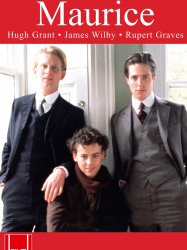Merchant Ivory Productions

If you like this company, let us know!
Merchant Ivory Productions is a film company founded in 1961 by producer Ismail Merchant (d. 2005) and director James Ivory. Their films were for the most part produced by Merchant, directed by Ivory, and 23 (of the 44 total films) were scripted by Ruth Prawer Jhabvala (d. 2013) in some capacity, all but two of those with solo credit. The films were often based upon novels or short stories, particularly the work of Henry James, E. M. Forster, and two novels by Jhabvala herself.
The initial goal of the company was "to make English-language films in India aimed at the international market." The style of Merchant Ivory films set and photographed in India became iconic. The company also went on to make films in England and America.
Some actors and producers associated with Merchant Ivory include Leela Naidu, Madhur Jaffrey, Aparna Sen, Shashi Kapoor, Jennifer Kendal, Hugh Grant, James Wilby, Rupert Graves, Simon Callow, Anthony Hopkins, Glenn Close, Uma Thurman, Emma Thompson, Vanessa Redgrave, Natasha Richardson, Ralph Fiennes and Helena Bonham Carter.
Of this collaboration, Merchant once commented: "It is a strange marriage we have at Merchant Ivory... I am an Indian Muslim, Ruth is a German Jew, and Jim is a Protestant American. Someone once described us as a three-headed god. Maybe they should have called us a three-headed monster!"
The expression "Merchant-Ivory film" has made its way into common parlance, to denote a particular genre of film rather than the actual production company. While 1965's Shakespeare Wallah put this genre on the international map, its heyday was the 1980s and 1990s with such films as A Room with a View and Howards End. A typical "Merchant-Ivory film" would be a period piece set in the early 20th century, usually in Edwardian England, featuring lavish sets and top British actors portraying genteel characters who suffer from disillusionment and tragic entanglements.
Best films
Filmography of Merchant Ivory Productions (15 films)
Production

Before the Rains (2007)
, 1h36Directed by Santosh Sivan
Origin United-kingdom
Genres Drama, Romance
Actors Linus Roache, Rahul Bose, Nandita Das, Jennifer Ehle, Lal, Paul Michael
Before the Rains is set in 1930s Malabar District of the Madras Presidency of British India, against the backdrop of a growing nationalist movement. An idealistic young Indian man, T.K. (Rahul Bose) finds himself torn between his ambitions for the future and his loyalty to tradition when people in his village learn of an affair between his British boss and close friend Henry Moores (Linus Roache) and a married village woman Sajani (Nandita Das).

Le Divorce (2003)
, 1h57Directed by James Ivory
Origin USA
Genres Drama, Comedy, Comedy-drama, Romance
Actors Kate Hudson, Naomi Watts, Glenn Close, Thierry Lhermitte, Catherine Samie, Melvil Poupaud
Isabel (Hudson) Walker travels to Paris to visit her sister, poet Roxy (Watts), who lives with her husband, Frenchman Charles-Henri, and her young daughter, Gennie. Roxy is pregnant, but her husband has just walked out on her without explanation. Isabel discovers that he has a married Russian lover, Magda Tellman, whom he intends to marry after securing a divorce from Roxy. Roxy refuses to divorce him.

The Golden Bowl (2000)
, 2h6Directed by James Ivory
Origin USA
Genres Drama, Romance
Themes Films about sexuality
Actors Kate Beckinsale, James Fox, Anjelica Huston, Nick Nolte, Jeremy Northam, Nickolas Grace
Dignified but impoverished aristocrat Prince Amerigo, whose illustrious Italian family occupies the decaying Palazzo Ugolini in Florence, is engaged to American socialite Maggie Verver. She shares an extremely close relationship with her millionaire father Adam, a retired widowed tycoon living in England who intends to finance the construction of a museum to house his invaluable collection of art and antiquities in an American city.

Jefferson in Paris (1995)
, 2h19Directed by James Ivory
Origin France
Genres Drama, Biography, Comedy-drama, Historical, Romance
Themes Political films, Histoire de France, French Revolution films
Actors Nick Nolte, Greta Scacchi, Jean-Pierre Aumont, Simon Callow, Seth Gilliam, James Earl Jones
Set in the period 1784–1789, the film portrays Jefferson when he was US minister to France at Versailles before the French Revolution. French liberals and intellectuals hope he will lead them away from the corruption of the court of King Louis XVI and Marie-Antoinette and toward a more democratic form of government. Although deploring the poverty of the common people, he embraces the riches of French culture and civilization. It is his first time abroad, and he takes advantage of the opportunity to extend his knowledge of liberal arts and science while absorbing the refinements France has to offer.

The Remains of the Day (1993)
, 2h14Directed by James Ivory
Origin United-kingdom
Genres Drama, Romance
Themes Films about the labor movement
Actors Anthony Hopkins, Emma Thompson, James Fox, Christopher Reeve, Hugh Grant, Ben Chaplin
In 1950s post-war Britain, Mr. Stevens, the butler of Darlington Hall, receives a letter from Miss Kenton, a recently divorced former co-worker employed as the housekeeper some twenty years earlier. Lord Darlington has died a broken man, his reputation destroyed after he had been denounced as a Nazi-sympathiser in the Daily Mail, and his stately country manor has been sold to a retired American Congressman, Mr. Lewis. Stevens is granted permission to borrow his Daimler, and he sets off to the West Country to meet Kenton.

Howards End (1992)
, 2h20Directed by James Ivory
Origin United-kingdom
Genres Drama, Comedy-drama, Romance
Actors Anthony Hopkins, Vanessa Redgrave, Helena Bonham Carter, Emma Thompson, Joseph Bennett, Prunella Scales
The story takes place in Edwardian England and concerns three families who represent three social classes: the Wilcoxes are wealthy capitalists, the class that is displacing the aristocracy; the Schlegel sisters standing for the enlightened bourgeoisie; and the Basts, a young couple down on their luck, who may be traced to the lower middle class. (Forster is clear that the novel is "not concerned with the very poor".) The film asks the question "Who will inherit England?" and answers it through the ownership of the house, Howards End, as it passes from person to person.

Maurice (1987)
, 2h20Directed by James Ivory
Origin United-kingdom
Genres Drama, Romance
Themes Films about sexuality, LGBT-related films, LGBT-related films, LGBT-related film
Actors James Wilby, Hugh Grant, Rupert Graves, Ben Kingsley, Denholm Elliott, Simon Callow
During a trip to a windswept beach, Maurice Hall, an 11-year-old schoolboy, receives instructions about the "sacred mysteries" of sex from his teacher, who wants to explain to the fatherless boy the changes he would experience in puberty.

A Room with a View (1986)
, 1h57Directed by James Ivory
Origin United-kingdom
Genres Drama, Comedy-drama, Romance
Actors Maggie Smith, Helena Bonham Carter, Denholm Elliott, Julian Sands, Simon Callow, Daniel Day-Lewis
Miss Lucy Honeychurch is from an English village in Surrey and is on holiday in Italy with her much older cousin and chaperone, Charlotte Bartlett. Charlotte is conventionally English, with an extremely restrictive personality and tends to get her way by expressing her emotions to manipulate others. Lucy has been brought up in an upper-middle class but loving and easygoing household, and had fewer inhibitions, which creates a strong tension between herself and Charlotte. They are in contrast with the more free-thinking and free-spirited backdrop of Italy. At a small pensione Lucy meets such people as Reverend Beebe, the two Miss Alans, and the author Miss Eleanor Lavish, but most importantly, the nonconformist Mr. Emerson and his handsome, philosophical son, George, who becomes friends with Charlotte. These men, although also English, represent the forward-thinking ideals of the turn-of-the-century, seeking to leave behind the repression and caution that was the norm in Victorian times. At first, the Emersons seem strange and unfamiliar to Lucy and Charlotte. They seem sincere but unaware of finer upper class Victorian manners. Mr. Emerson offers to switch rooms with the women, who desire a room with a view. Charlotte is offended, believing him to be rude and tactless for what she perceives to be indebting them with his offer. As Lucy begins her journey to maturity, she finds herself drawn to George due to his mysterious thinking and readily expressed emotions.

The Courtesans of Bombay (1983)
, 1h13Directed by Ismail Merchant
Origin United-kingdom
Genres Documentary
Actors Saeed Jaffrey, Zohra Sehgal
Kareem Samar, Saeed Jaffrey, and Zohra Sehgal are professional actors who interact with actual inhabitants of the area. Samar portrays a rent collector representing a landlord who was a friend of Merchant and approved the project. Jaffrey's role is that of an actor whose infatuation with one of the dancers becomes an obsession, and Segal is a retired courtesan who recalls her earlier life when her aunt arranged for her care by a wealthy benefactor.

Heat and Dust (1983)
, 2h13Directed by James Ivory
Origin United-kingdom
Genres Drama, Historical, Romance
Actors Julie Christie, Greta Scacchi, Shashi Kapoor, Christopher Cazenove, Susan Fleetwood, Zakir Hussain
In 1982, Anne, an English woman, intrigued by the fate of her great-aunt Olivia, whose letters and diary she has inherited, interviews the elderly Harry Hamilton-Paul, who in his youth was Olivia's close friend when they were both living in India.

The Guru (1969)
, 1h52Directed by James Ivory
Genres Comedy
Actors Rita Tushingham, Michael York, Utpal Dutt, Madhur Jaffrey, Barry Foster, Aparna Sen
Distribution

Eternity and a Day (1998)
, 2h10Directed by Theo Angelopoulos
Origin France
Genres Drama
Actors Bruno Ganz, Isabelle Renauld, Fabrizio Bentivoglio, Michael Giannatos, Pétros Márkaris, Petros Fyssoun
Alexander (Bruno Ganz), a bearded poet, leaves his seaside apartment in Thessaloniki after learning he has a terminal illness and must enter a hospital the next day for an unspecified "test". He is trying to get his affairs in order and find a new master for his dog.
 , 2h2
, 2h2Directed by Shadi Abdessalam
Origin Egypte
Genres Drama, Historical
Themes Films set in Africa
Actors Nadia Lutfi
Set in 1881, before a year of British colonial rule, it is based on the true story of the Abd el-Rasuls, an Upper-Egyptian clan that had been robbing a cache of mummies discovered at tomb DB320 near the village of Kurna, and selling the artefacts on the illicit antiquities black market. After a conflict within the clan, one of its members goes to the police, helping the Antiquities Service find the cache.

Aparajito (1956)
, 1h50Directed by Satyajit Ray
Origin Inde
Genres Drama, Historical
Actors Karuna Banerjee, Kali Banerjee
Apu and his parents, who left their home in Bengal, has moved to an apartment in Varanasi where Apu's father Harihar (Kanu Banerjee) works as a priest. Harihar dies and Sarbajaya (Karuna Banerjee) starts working as a maid. Apu and his mother return to Bengal and settle in the village Mansapota. Apu asks his mother to send him to a school. He has an inquisitive mind and studies diligently; he receives a scholarship to go to Calcutta for further studies. Sarbajaya does not want to let her son leave but she gives in and helps him prepare to leave.

Pather Panchali (1955)
, 2h2Directed by Satyajit Ray
Origin Inde
Genres Drama, Historical
Actors Karuna Banerjee, Sharmila Tagore, Tulsi Chakraborty
Harihar Roy (Kanu Banerjee) earns a meagre living as a pujari (priest) in Nischindipur, rural Bengal, and dreams of a better career as a poet and playwright. His wife Sarbajaya (Karuna Banerjee) takes care of their children, Durga (Uma Dasgupta) and Apu (Subir Banerjee), and Harihar's elderly cousin, Indir Thakrun (Chunibala Devi). Because of their limited resources, Sarbajaya resents having to share her home with the old and helpless cripple Indir. At times, Sarbajaya's taunts become offensive, forcing Indir to take temporary refuge in the home of another relative. Durga is fond of Indir and often gives her fruit she has stolen from a wealthy neighbour's orchard. One day, the neighbour's wife accuses Durga of stealing a bead necklace (which Durga denies) and blames Sarbajaya for encouraging her tendency to steal.
 Connection
Connection